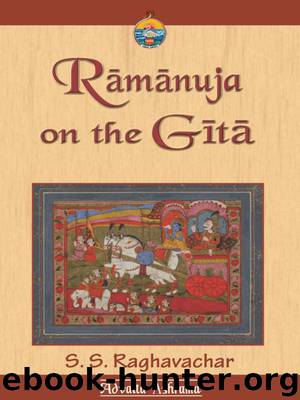Ramanuja on The Gita by S.S. Raghavachar

Author:S.S. Raghavachar [Raghavachar, S.S.]
Language: eng
Format: epub
Publisher: Advaita Ashrama
Published: 2017-12-13T18:30:00+00:00
CHAPTER EIGHT
The whole of the eighth chapter is a continuation and elaboration of the concluding words of the preceding one. It takes up the question of the life of the three classes of devotees, their modes of life, the last stages of their contemplation of God before the close of their life and their different supra-mundane destinies.
Arjuna seeks elucidation of the import of the six technical terms and wishes to be explicitly told of the manner and matter of the final contemplation of the dying Sādhaka.
The explanations follow the order of interrogation. By Brahman in this context is to be understood the imperishable spiritual principle in man. There is frequent usage of the term in this sense in the Upaniṣadic literature. Matter in its subtle forms by which the spirit is tied up in embodiment is called Adhyātma. The two ate to be understood for purposes of forming the positive ideal to be pursued and the evil to be discarded respectively. Spirit is to be attained and material entanglement is to be discarded. Karma means here the process of generation by which spirit is enmeshed in matter. Even this is to be understood for purposes of avoidance, for it starts the evil phenomenon of embodiment. These three represent the principal items for the understanding of the devotee who is pursuing self-realization, who discards the semi-materialistic aim of prosperity and who has not yet raised himself to aspiring after God-realization.
The perishable configurations of the physical are called Adhibhuta. The experiencer of the highest pleasures of life open to the bound soul is called Adhidaivata. The point in this characterization is that the aspirant after prosperity surpassing even that of the gods like Indra is planning to elevate his self as enjoyer above the selves of even the gods.
Śrī Kṛṣṇa says that by Adhiyajña one has to understand God. Truly the Supreme Being is the central reality in all sacrifice. As has been said before sacrifice is the main principle of a good life and the ultimate object of worship in sacrifice and the guarantee of its fruitfulness is the ultimate God-head.
The six terms have received their due explanations. Śrī Kṛṣṇa addresses himself to answer the question about the worthy way of contemplation at the moment of death. The general principle is propounded that whoever fixes his mind on God at the last moment attains the form and glory that he attributes to God in that contemplation. The contemplation at the point of death has the power of conferring on the individual soul the form and characteristics it associates with the object in that contemplation. The final contemplation has this efficacy even when the object of contemplation is not God. This terminal contemplation is determined by the habitual thoughts of the individual in the whole course of his life. This fact imposes on men the obligation to think of God continually in the whole duration of their lives and to engage in activities that bring up thoughts of God necessarily. One
Download
This site does not store any files on its server. We only index and link to content provided by other sites. Please contact the content providers to delete copyright contents if any and email us, we'll remove relevant links or contents immediately.
Fingersmith by Sarah Waters(2526)
Kundalini by Gopi Krishna(2175)
Wheels of Life by Anodea Judith(2136)
Indian Mythology by Devdutt Pattanaik(1930)
The Bhagavad Gita by Bibek Debroy(1918)
The Yoga of Jesus: Understanding the Hidden Teachings of the Gospels by Paramahansa Yogananda(1845)
Autobiography of a Yogi (Complete Edition) by Yogananda Paramahansa(1809)
The Man from the Egg by Sudha Murty(1801)
The Book of Secrets: 112 Meditations to Discover the Mystery Within by Osho(1657)
Chakra Mantra Magick by Kadmon Baal(1635)
The Sparsholt Affair by Alan Hollinghurst(1578)
Gandhi by Ramachandra Guha(1523)
Sparks of Divinity by B. K. S. Iyengar(1519)
Avatar of Night by Tal Brooke(1515)
Karma-Yoga and Bhakti-Yoga by Swami Vivekananda(1487)
The Bhagavad Gita (Classics of Indian Spirituality) by Eknath Easwaran(1474)
The Spiritual Teaching of Ramana Maharshi by Ramana Maharshi(1424)
Hindoo Holiday by J. R. Ackerley(1370)
Hinduism: A Very Short Introduction (Very Short Introductions) by Knott Kim(1364)
